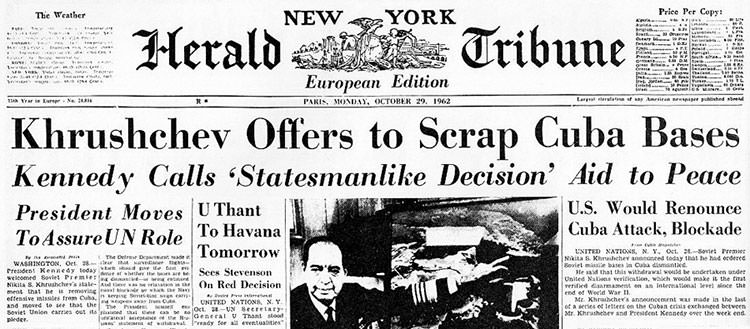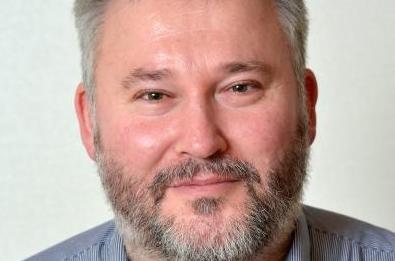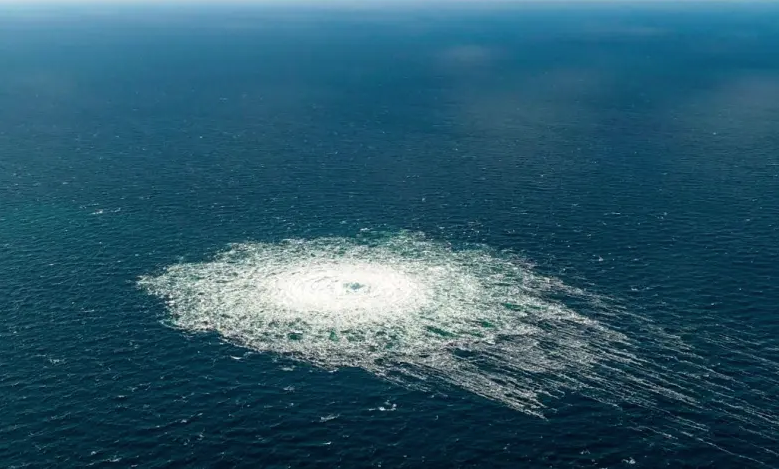ANALYSIS: As the rhetorical heat intensifies, the world urgently needs a neutral arbiter to bring the temperature down.

Can cooler heads prevail, as they did in the 1962 Cuban Missile Crisis? – we need the same now, says Russia expert Greg Simons.
This comment was provided to me last week, after Putin’s nuclear speech, before Jacinda’s ‘I’m-not-a-fascist’ speech, before the referenda and call for military mobilisation in Russia, and before the Nordstream pipeline sabotages. All in just over a week.
So let’s wind it back a bit.
Sign up to receive our newsletter
Nukes
While the western media proclaims that Russian President Vladimir Putin has threatened nuclear war, his words have of course, been completely minced.
Putin made a speech on 21 September, responding to what he says are escalations in the conflict in Ukraine, namely statements by some NATO states pondering the use of nuclear weapons against Russia, and responded to this with a warning.
“In Washington, London, Brussels they are directly pushing Kyiv to transfer military operations to our territory. No longer hiding, they say that Russia should be defeated by all means on the battlefield, followed by the deprivation of political, economic, cultural, in general, any sovereignty, with the complete plunder of our country.
“Nuclear blackmail was also launched. We are talking not only about the shelling of the Zaporizhzhya nuclear power plant, which is encouraged by the west, which threatens a nuclear catastrophe, but also about the statements of some high-ranking representatives of the leading NATO states about the possibility and admissibility of using weapons of mass destruction against Russia – nuclear weapons.
“To those who allow themselves to make such statements about Russia, I would like to remind you that our country also has various means of destruction, and for some components more modern than those of the NATO countries. And if the territorial integrity of our country is threatened, we will certainly use all the means at our disposal to protect Russia and our people. It’s not a bluff.”
So, it’s pretty clear: ‘If the west attacks us, we have the weapons to attack them’. Former Russian President Medvedev has since clarified when Russia would consider using nukes – they are all defensive scenarios, a ‘no-first-use’ policy.
Yet, US President Joe Biden revoked the same policy in April, so the US can now use nuclear weapons in the first instance. Listen to this Grey Zone interview with former Swiss intelligence officer and NATO adviser Jacques Baud on this issue and the new phase the conflict is moving into.

Last week I asked Greg Simons of Uppsala University to comment on this rhetorical escalation.
“Things are not in a good place right now and the so-called leaders of the west are seemingly oblivious to the seriousness of the situation. Their ignorant and arrogant attitudes are putting many people at risk.
“There must be a genuine period of diplomacy and negotiation and not the façade of it that was seen in US and UK representatives between November 2021 and February 2022. The situation will continue to deteriorate and become more hazardous otherwise.
“A realistic and not ‘romantic’ vision and comprehension of what the world is heading towards needs to be clearly understood and behaviour must adapt accordingly, such as the situation surrounding the 1962 Cuban Missile Crisis.”
Simons says the western governments and media are lying by omission and playing dangerous political games. The public need to understand this and look for other sources of information to compliment them, “such as Consortium News, FAIR or Media Lens,” he suggests.
Sign up to receive our newsletter
Ignoring history
Since Simons made these comments, New Zealand Prime Minister Jacinda Ardern has been on the world stage at the United Nations, using doublespeak to call for a global censorship regime and to denounce Putin’s invasion of Ukraine:
“Putin’s suggestion that it could at any point deploy further weapons that it has at their disposal, reveals the false narrative that they have based their invasion on. What country, who claims to be a liberator, threatens to annihilate the very civilians they claim to liberate. This war is based on a lie,” she said.
It should be denounced, as all wars should. But she has deliberately omitted the qualifying context to his words.
Few people in the west seem to understand how patient Putin has been with western provocation for years before the invasion. NATO continued to unwisely advance its presence since the Berlin Wall fell, right to the border of Russia, in the full knowledge it was poking the bear.
For the last eight years, NATO has backed a corrupt Ukranian government, funneled arms to neo-nazis, funded attacks on Donbass and violated the Minsk Treaties. We can only dream of where the world would be now if they had been honoured.
Military analyst Scott Ritter, writing in Consortium News noted:
“The reality is that since the collapse of the Soviet Union at the end of 1991, the US and its European allies have been conspiring to subjugate Russia in an effort to ensure that the Russian people are never again able to mount a geopolitical challenge to an American hegemony defined by a “rules based international order” that had been foisted on the world in the aftermath of the Second World War …
“When Putin spoke about the need for ‘necessary, urgent steps to protect the sovereignty, security and territorial integrity of Russia’ from ‘the aggressive policies of some western elites who try by any means necessary to maintain their supremacy,’ he had this history in mind.”
US Interference in Ukraine goes back even further if you are interested in learning the sordid history. It is not a short story.
Russia’s red line
But Russophobic propaganda has kept western publics in complete ignorance of the actual dynamics, and continued to build an image of Putin as a reckless psychopath, rather than the stoic and even measured statesman he is (does it feel like blasphemy to call him ‘measured’? That’s the propaganda working).
For most people it’s as simple as ‘Putin bad, Ukraine good’. But we are where we are because this is where the US and NATO want to be, this is certainly not the outcome Russia has been seeking to advance for the last decade. Russia’s overtures to the west were repeatedly rebuffed, hence its pivot to Asia.
Despite Putin’s stoicism, it was understood that Ukraine going nuclear would be an unacceptable last straw that materially threatened the security of Russia and that this would not be tolerated. Last year Putin noted how Russia’s ‘red lines’ were too easily crossed by the US/NATO.
“We’re constantly voicing our concerns about this, talking about red lines, but we understand our partners – how shall I put it mildly – have a very superficial attitude to all our warnings and talk of red lines,” Putin said.
Then in February this year, at the annual Munich Security Conference, the President of Ukraine, Volodymyr Zelensky, hinted at crossing the final red line. We all know what happened next.
Simons, who is also an expert on the use of propaganda and crisis communications, has a message for the public: that we must stop buying the propaganda. When emotions are used to manipulate the public, the point is to eradicate individual critical thinking and the public must snap out of it.
In an eerily prescient statement Simons said in an email exchange on 22 September:
“The costs of the western elites’ folly will be taken by the public and not them, there is nothing ethical or moralistic in what they say, and not everyone is in the same boat. This will be very clearly seen and felt soon by the mass publics if we continue this path.”
Most of the world is not stupid enough to back Russian sanctions. Most of the world can’t afford to. New geopolitical lines are being drawn, much of it around the search for energy security and pragmatism. But the west appears intentionally self-defeating.

Sign up to receive our newsletter
Nordstream is sabotaged
So, cooler heads did not prevail. While Putin is of course being blamed, it makes no sense. Russia does not benefit, Europe does not benefit. Besides, Biden confessed, before it was done.
So did neocon Victoria Nuland:
Three weeks ago Putin said he would supply gas if sanctions were lifted:
“After all, if they need [gas] urgently, if things are so bad, just go ahead and lift sanctions against Nord Stream 2, with its 55 billion cubic metres per year – all they have to do is press the button and they will get it going. But they chose to shut it off themselves; they cannot repair one pipeline and imposed sanctions against the new Nord Stream 2 and will not open it. Are we to blame for this? Let them think hard about who is to blame and let none of them blame us for their own mistakes. Gazprom and Russia have always fulfilled and will fulfil all obligations under our agreements and contracts, with no failures ever.”
Joe Lauria writes at Consortium News that the US/NATO are most likely responsible for the sabotage, to prevent an end to the war.
“Evidently, the fear in Washington is that the war might not continue for as long as it wants. I argued on 4 February, twenty days before the invasion, that the US was setting a trap for Russia and needed it to invade Ukraine in order to unleash an information, economic and proxy war with the ultimate aim of regime change in Moscow. All that was confirmed by 27 March.”
US strategic interests (‘We are all adults‘)
Are we really going to deceive ourselves about who is responsible? As Gonzalo Lira, an American commentator resident in Ukraine, says in his video above, “we are all adults”. He summarises the implications of the sabotage:
It means that Europe will have no gas this winter, or not enough. It means that European industry will have no engine, and there are likely to be food shortages. It all looks much more like an act of war against Europe than Russia. It also means that there is no possible Russo-European détente. What good are supply agreements without a pipeline?
A nicely timed new Baltic pipeline to Poland is set to come online – will it be enough? Hardly. It will push Europe into reliance on expensive US shale gas, a goal Washington has not been shy about. The US has been cagey about Russian gas in Germany since forever.
This article from June provides a good overview of the Ukraine situation and where it might go, and makes the following observation: “America’s current policy is a badly planned, ad hoc and misguided effort to disrupt Europe’s status quo relationship with Russia such that rapprochement remains out of reach.”
Simons said that NATOs reason for being has always been “to keep Germany down, Russia out and the US in Europe”.
“That is what these current events are all about, and the EU is a slave object in the process of creating a cage to contain it. There is zero self-preservation instinct in Europe among the global liberal elite politicians.”
And as Jacques Baud said in his Gray Zone interview, “nobody cares about Ukraine, in fact. We have just instrumentalised US strategic interests. Not even European interests.”
The whole thing has gotten way too dangerous. Dystopian.
We could see a nuclear exchange, and yet where are the neutral arbiters stepping forth (isn’t that what the UN is for?). There are no calls for de-escalation from any of our western leaders. Joe Lauria has suggested the Saudis may be the world’s best bet.
This could have all been stopped if NATO had agreed to implement the Minsk Agreements. Where are the pacifists? The only one I’ve seen was shouted down by a loudmouth.
Rhetorical heat
Now Russia will absorb four regions in Ukraine after they voted for reunification, which fundamentally shifts the situation – it is no longer a special military operation. Ukraine military activity against these former regions will now be against “Russia herself”. Watch Greg Simons’ commentary in a 30 September tv debate.
Simons commented on Medvedev’s statement that he did not believe NATO would defend Ukraine if Russia were to hypothetically deploy nuclear weapons, which has upped the ante, he says.
“I would hope that this is only a rather hard political discourse to try and stop this continual escalation. I mean it’s an extremely risky and dangerous game to go to this level. I think that it would be unlikely that nuclear weapons would be used in Ukraine, even so-called tactical nuclear weapons … this makes the whole discourse for both sides a bit more unstable because there are certain lines being crossed and it’s hard to bring them back.”
Putin made a speech on Friday after the agreements to admit Donetsk, Luhansk, the Zaporizhia and Kherson Regions to Russia were signed.
Full of nationalistic fervour and state-building sentiment, he turned up the rhetorical heat on the west, denouncing the west’s continued colonialism and abusive foreign policy in its attempts to maintain hegemony, and affirmed the global transformation to a multi-polar world as inevitable.
“The west is counting on impunity, on getting away with everything. In fact, it has gotten away with everything so far. Agreements in the field of strategic security go to the wastebasket; agreements reached at the highest political level are declared false; firm promises not to expand NATO to the east, as soon as our former leaders bought into them, turned into a dirty deceit; treaties on anti-missile defense and intermediate- and shorter-range missiles have been unilaterally broken under far-fetched pretexts,” Putin said.
He continues:
“All over the world, including in Europe and the United States, as I said, we have many like-minded people, and we feel, we see their support. A liberation, anti-colonial movement against unipolar hegemony is already developing within the most diverse countries and societies. His subjectivity will only grow. It is this force that will determine the future geopolitical reality.”
Stakes is high
Undoubtedly, this multi-polar world is not a reality that the US/NATO wishes to unfold. And so, we have reached a “possible fateful moment’, as American economist and commentator Paul Craig Roberts says.
This is a time for spiritual leadership – for someone on world stage with humility and wisdom to step forth and take the temperature down – where are they?
In February and March there was a genuine possibility of peace, according to Baud: Zelensky twice approached the Russians to establish a peace agreement, but the west refused to support these agreements by threatening to withdraw support if Ukraine negotiated with Russia. A third occasion was in August, was when Turkish President Erdogan offered to mediate. Once more the west prevented it. Do you remember hearing about this in the news?
Voices from the global south have been speaking up, however. Leaders from 66 countries used their General Assembly speeches to call urgently for diplomacy to end the war in Ukraine through peaceful negotiations, as the UN Charter requires. I’ve seen no mainstream reporting of this.
The onus is on Biden and Putin, Scott Ritter writes: “Now is the time for the kind of political maturity leaders rarely demonstrate.”
The public too, must let the scales fall from their eyes.
As Paul Craig Roberts writes: “That we could be in this extremely dangerous position is due to the total absence in the west of an honest and independent media and of honest and competent Russian experts. Essentially, there is no intelligence in the west among those making decisions and no accurate information getting through to the western populations.”
Stay curious …